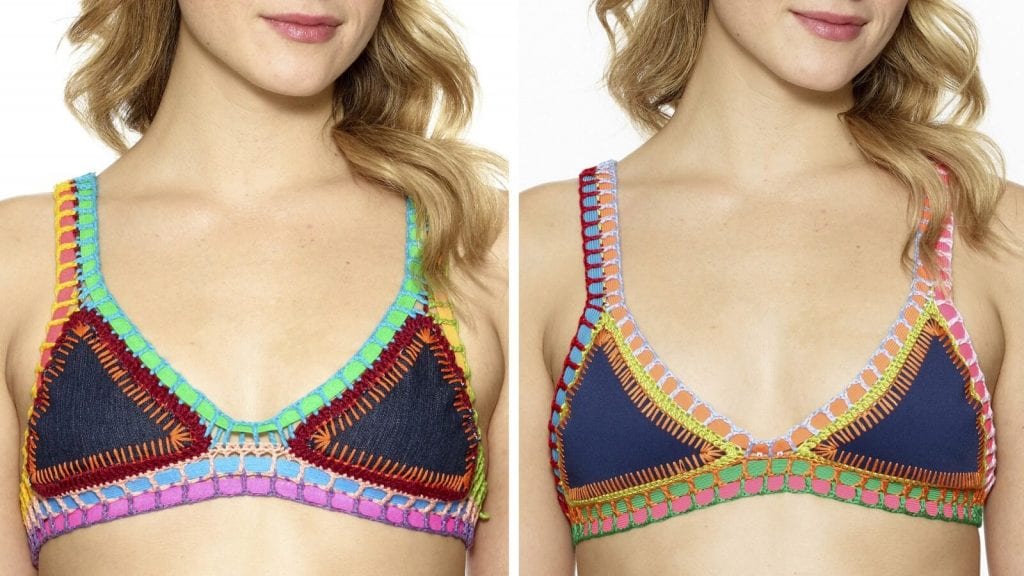The heated fight over rival bikinis that spawned a widely-circulated New York Times article is headed for trial on the basis of a single count thanks to a recent ruling from a New York federal court. A year and a half after Brazilian artisan Maria Solange Ferrarini filed suit against designer Ipek Irgit and her buzzy brand Kiini, accusing them of copying what the court calls “hand knitted, colorful crochet bikinis,” both parties are walking away from the latest round of the highly-publicized case with a win.
In a decision dated January 9, Judge Lorna G. Schofield of the U.S. District Court for the Southern District of New York (the case was initially filed in California federal court but was transferred, as New York is where the defendants are located) sounded off on the motion to dismiss that Irgit filed in 2018, and determined that while Ferrarini’s copyright infringement claim may proceed, her claims for unfair competition, common law conversion, and intentional interference with prospective economic advantage must be dismissed.
Judge Schofield set the stage in her 16-page decision by summarizing Ferrarini’s legal action as centering on the allegations that the defendants built their brand on a certain bikini design, in connection with which they “falsely portrayed Irgit” – in the media and in a U.S. Copyright Office filing – “as the creator of.” The problem, according to Ferrarini’s complaint, is that Irgit allegedly hijacked the design after she purchased a lookalike bikini from Ferrarini on the beach in Brazil in 2012. (Irgit has argued that while she launched her brand in 2013, she had been making similar bathing suits for years, dating back to “when she was 10 or 11” when she would make them with her grandmother).
Fast forward six years to June 2018, and Ferrarini – with the help of American legal counsel – filed suit. In the complaint, Ferrarini’s counsel accused Irgit and Kiini, LLC of copyright infringement, a violation of California’s Unfair Competition law, conversion and/or civil theft under California and New York common law, and intentional interference with prospective economic advantage. Thanks to the defendants’ motion to dismiss and Judge Schofield’s January 9 decision, only the copyright infringement cause of action remains on the table.
According to the court, Ferrarini’s unfair competition, conversion, and intentional interference claims are rife with problems, namely, they are already covered by – and thus, are preempted by – her federal copyright infringement claim, and even if they were not preempted, Ferrarini “fails to make allegations sufficient to state a claim” for each cause of action, the judge stated.

Speaking specifically to Ferrarini’s unfair competition claim, Judge Schofield asserted that her “allegations that the defendants made misrepresentations regarding the [creator of the] bikini do not provide the extra element necessary to avoid preemption,” nor does her claim that the defendants engaged in “reverse passing off,” as “reverse passing off occurs when the alleged infringer sells the plaintiff’s products as its own.” That is not what happened here, per Judge Schofield, because “the defendants are selling bikinis that they manufactured themselves” under their own name.
In terms of her conversion claim, Ferrarini argues that by “registering the copyright in the design through a false claim of authorship, [Irgit] intentionally and substantially interfered with [Ferrarini’s] copyright, taking it as her own and misappropriating the funds derived from the copyright and litigation based on its registration” – namely, an infringement lawsuit and subsequent settlement with Victoria’s Secret – for her own personal use and enjoyment.”
Siding with Irgit, the court held that the claim is preempted because it “‘assert[s] rights equivalent to those protected within the general scope’ of the Copyright Act.” And even if it was not preempted, Judge Schofield held that the claim is a losing battle, nonetheless, as “intellectual property cannot form the basis of an action for conversion.”
Finally, the court turned its attention to Ferrarini’s claim of intentional interference with prospective economic advantage, in connection with which she alleged that Kiini got in the way of “[a]n economic relationship that existed between Ferrarini and third parties that purchased her bikinis [in Brazil] and/or were actively interested in or actually pursuing, developing, marketing, licensing, exploiting, and utilizing [her] one-of-a-kind bikinis.” To this, the court essentially said ‘not so fast,’ and dismissed the claim on the basis of preemption, while also stating that Ferrarini’s “allegations are too general and conclusory to be credited” as indicative of “a pre-existing, non-speculative relationship with third parties.”
With those three claims out of the way, the court gave the green-light to let Ferrarini’s copyright infringement claim – which was added to the case after it was first filed (as Ferrarini only secured her copyright registration in April 2019) – go forward, holding that Ferrarini preliminarily made her infringement claim in a “sufficient [enough] factual matter, [that if] accepted as true, ‘states a claim to relief that is plausible on its face.’”
To be exact, Judge Schofield determined that Ferrarini sufficiently made her copyright infringement claim and that such a claim is not barred by the statute of limitations, which is what counsel for Kiini argued. According to the court, despite Kiini’s argument that “the extensive press coverage of [its] bikini in 2014 and 2015, in combination with [its] registration of the copyright, is sufficient to have put [Ferrarini] on notice that Kiini claimed the design as [its] own,” and should have prompted her to file suit earlier, the court held that Ferrarini’s copyright claim “is timely because it accrued in 2018, when [she] was informed of the defendants’ infringement.”
“Nothing in the complaint indicates that [Ferrarini] was aware of the defendants’ bikini sales prior to 2018,” according to the court, which noted that if “mere registration” with the Copyright Office were sufficient to put a plaintiff on notice of infringement, that would a “vastly burdensome” standard.
In deciding the statute of limitations issue, the court noted that the “the threshold question” at hand is not about infringement, itself, but instead, involves a determination of ownership of the copyright at issue, since both the “plaintiff and the defendants have registered the bikini design with the U.S. Copyright Office.” Given that “any finding of infringement must be predicated on a finding of ownership of the copyright in question,” and since the “defendants do not concede that [Ferrarini] owns the copyright” at issue, what will certainly be up for debate are Ferrarini’s and Kiini’s competing claims of ownership over the bikini design.
As such, the case – minus the unfair competition, common law conversion, and intentional interference with prospective economic advantage claims – moves forward.
*The case is Maria Solange Ferrarini v. Ipek Irgit, et al., 1:19-cv-00096 (SDNY).














